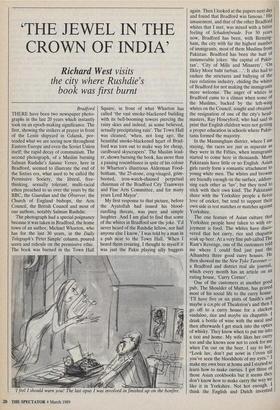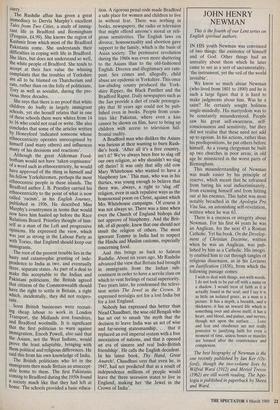`THE JEWEL IN THE CROWN OF INDIA'
Richard West visits
the city where Rushdie's book was first burnt
Bradford THERE have been two newspaper photo- graphs in the last 20 years which instantly took on an epoch-making significance. The first, showing the strikers at prayer in front of the Lenin shipyard in Gdansk, por- tended what we are seeing now throughout Eastern Europe and even the Soviet Union itself; the rapid decay of communism. The second photograph, of a Muslim burning Salman Rushdie's Satanic Verses, here in Bradford, seemed to illustrate the end of the Sixties era, what used to be called the Permissive Society, the liberal, free- thinking, sexually tolerant, multi-racial ethos preached to us over the years by the BBC, the Guardian and the Observer, the Church of England bishops, the Arts Council, the British Council and most of our authors, notably Salman Rushdie.
The photograph had a special poignancy because it was taken in Bradford, the home town of an author, Michael Wharton, who has for the last 30 years, in the Daily Telegraph's 'Peter Simple' column, poured scorn and ridicule on the permissive ethic. The book was burned in the Town Hall Square, in front of what Wharton has called 'the vast smoke-blackened building with its bell-booming towers piercing the rainy skies and indeed, as some believed, actually precipitating rain'. The Town Hall was cleaned, 'when, not long ago, the beautiful smoke-blackened heart of Brad- ford was torn out to make way for cheap, cardboard skyscrapers'. The Muslim lead- er, shown burning the book, has more than a passing resemblance in spite of his colour to Wharton's illustrious Alderman Food- botham, 'the 25-stone, crag-visaged, grim- booted, iron-watch-chained perpetual chairman of the Bradford City Tramways and Fine Arts Committee, and for many years Lord Mayor'.
My first response to that picture, before the Ayatollah had issued his blood- curdling threats, was pure and simple laughter. And I am glad to find that some of the whites in Bradford saw the joke. 'I'd never heard of the Rushdie fellow, nor had anyone else I know,' I was told by a man in a pub near to the Town Hall. 'When I heard them creating, I thought to myself it was just the Pakis playing silly buggers '1 feel I should warn you! The last opus I was involved in finished up on the bonfire.'
again. Then I looked at the papers next day and found that Bradford was famous.' His amusement, and that of the other Bradford whites that I met, was mixed with a bitter feeling of Schadenfreude. For 30 years now, Bradford has been, with Birming- ham, the city with far the highest number of immigrants, most of them Muslims from Pakistan. Bradford has been the butt of innumerable jokes: 'the capital of Pakis- tan', 'City of Mills and Minarets', 'On Ilkley Moor baht turban...'. It also had to endure the strictures and bullying of the race relations industry, chiding the whites of Bradford for not making the immigrants more welcome. The anger of whites in Bradford came to a climax when some of the Muslims, backed by the left-wing whites on the Council, sought and obtained the resignation of one of the city's head- masters, Ray Honeyford, who had said in print that English children were not getting a proper education in schools where Pakis- tanis formed the majority. In the Manningham district, where I am staying, the races are just as separate as they were in the Fifties, when immigrants started to come here in thousands. Many Pakistanis have little or no English. Asian girls rarely form a romantic attachment to young white men. The whites and browns are friendly enough on the surface, addres- sing each other as `ltiv', but they tend to stick with their own kind. The Pakistanis share with the Yorkshire people a fierce love of cricket, but tend to support their own side in test matches or matches against Yorkshire.
The one feature of Asian culture that Yorkshire people have taken to with en- joyment is food. The whites have disco- vered that hot curry, rice and chapattis soak up beer. At a very fine pub called The Ram's Revenge, one of the customers told me where I could find just past the Alhambra three good curry houses. He then showed me the New Tyke Taverner — a Bradford and district real ale journal, which every month has an article on an eating house, 'Curry Corner'. One of the customers at another good pub, The Shoulder of Mutton, has geared most of his social life to the curry house: `I'll have five or six pints of Smith's and maybe a cJLple of Theakston's and then I go off to a curry house for a chicken vindaloo, rice and maybe six chapattis. I drink a bottle of wine with the meal and then afterwards I get stuck into the optics of whisky. They know when to put me into a taxi and home. My wife likes her curry too and she knows now not to cook for me when I'm out on the beer. I say to he!, "Look luv, don't put nowt in t'oven till you've seen the bloodshots of my eyes." I make my own beer at home and I started to learn how to make curries. I got three of those Asian cookbooks but it seems they don't know how to make curry the way we like it in Yorkshire. Not hot enough. I think the English and Dutch invented curry.'
The Rushdie affair has given a great immediacy to Deryla Murphy's excellent Tales from Two Cities, a study of immig- rant life in Bradford and Birmingham (Penguin, £4.99). She knows the region of Kashmir from which most of the Bradford Pakistanis come. She understands their difficulties in coping with life in Bradford. She likes, but does not understand so well, the white people of Bradford. She tends to accept at their face value the whining complaints that the troubles of Yorkshire are all to be blamed on Thatcherism and Cuts, rather than on the folly of politicians, Tory as well as socialist, during the pre- vious three decades.
She says that there is no proof that white children do badly in largely immigrant schools, yet she herself relates that in one of these schools there were whites from 14 to 16 who could not read or write. She also concludes that some of the articles written by Honeyford 'indicated someone whose ethnocentricity operates unrecognised by himself (and many others) and influences many of his decisions and reactions'.
Although the great Alderman Food- botham would not have 'taken cognisance' of a word such as ethnocentricity, he would have approved of the thing in himself and his fellow Yorkshiremen, perhaps the most ethnocentric people in these islands. The Bradford author J. B. Priestley carried his ethnocentricity to the point of what is now called 'racism', in his English Journey, published in 1936. He described Miss Murphy's countrymen in terms that would now have him hauled up before the Race Relations Board. Priestley thought of him- self as a man of the Left and progressive opinions. He expressed the view, which was just as strong in the Labour Party as with Tories, that England should keep out immigrants.
The root of the present trouble lies in the hasty and catastrophic granting of inde- pendence to India as two, and eventually three, separate states. As part of a deal to make this acceptable to the Indian and Pakistani politicians, the British agreed that citizens of the Commonwealth should have the right to settle in Britain, a right which, incidentally, they did not recipro- cate.
Soon British businesses were recruit- ing cheap labour to work in London Transport, the Midlands iron foundries, and Bradford woolmills. It is significant that the first politician to warn against immigration, Enoch Powell, also said that the Asians, not the West Indians, would prove the least adaptable, bringing with them political and religious differences. He said this from his own knowledge of India. The British politicians who let in the immigrants then made Britain an unaccept- able home to them. The first Pakistanis coming to Bradford during the 1950s found a society much like that they had left at home. The schools provided a basic educa- tion. A rigorous penal code made Bradford a safe place for women and children to live in without fear. There was nothing in books, newspapers, the radio or television that might offend anyone's moral or reli- gious sensitivities. The English laws on divorce, homosexuality and abortion gave support to the family, which is the basis of Asian society. The permissive revolution during the 1960s was even more shattering to the Asians than to the old-fashioned English. Divorce and illegitimacy are ram- pant. Sex crimes and, allegedly, child abuse are epidemic in Yorkshire. This once law-abiding county produced the York- shire Ripper, the Black Panther and the Bradford Rapist. Daily newspapers such as the Sun provide a diet of crude pornogra- phy that 30 years ago could not be pub- lished even in books. People from coun- tries like Pakistan, where even a kiss cannot be shown on film, have to bring up children with access to television full- frontal nudity. A Bradford man who dislikes the Asians was furious at their wanting to burn Rush- die's book. 'After all it's a free country, isn't it? We've always been free to slag off our own religion, so why shouldn't we slag off theirs? It was only that silly old cow Mary Whitehouse who wanted to have a blasphemy law.' This man, who was in his thirties, was young enough to believe that there was, always, a right to 'slag off religion, even in such repulsive ways as the homosexual poem on Christ, against which Mrs Whitehouse campaigns. Of course it was not always so. There was a time when even the Church of England bishops did not approve of blasphemy. And the Brit- ish, of all people, knew that one should not insult the religion of others. The most ignorant Tommy in India had to respect the Hindu and Muslim customs, especially concerning food. And this brings us back to Salman Rushdie. About six years ago, Mr Rushdie advanced the view that Britain had brought in immigrants from the Indian sub- continent in order to have a servile class on which to vent feelings of racial superiority. Two years later, he condemned the televi- sion series The Jewel in the Crown. It expressed nostalgia not for a lost India but for a lost England.
Nobody has expressed this better than Nirad Chaudhuri, the wise old Bengali who has set out to smash 'the myth that the decision to leave India was an act of wise and far-seeing statesmanship, ... that it replaced an evil imperial system with a free association of nations, and that it opened an era of sincere and real Indo-British friendship'. He calls the English decadent. In his latest book, Thy Hand, Great Anarch! , Chaudhuri says that even he, in 1947, had not predicted that as a result of independence millions of people would leave the three secession states to live in England, making her 'the Jewel in the Crown of India'.

















































 Previous page
Previous page